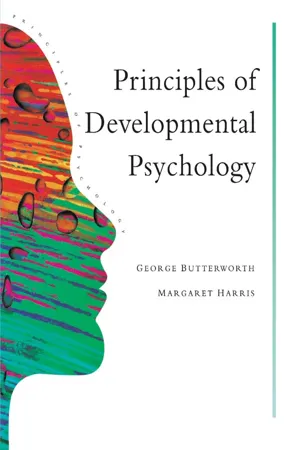Developmental Psychology
Developmental psychology is the study of how individuals change and grow over the course of their lives. It focuses on the physical, cognitive, emotional, and social development that occurs from infancy through adulthood. This field examines various factors that influence development, such as genetics, environment, and social interactions.
8 Key excerpts on "Developmental Psychology"
- Nancy Fenton, Jessica Flitter(Authors)
- 2015(Publication Date)
- Research & Education Association(Publisher)
...Chapter 11 Developmental Psychology Developmental Psychology focuses on the physical, cognitive, social, and moral development of humans that occurs across the lifespan from conception to death. Typically developmental psychologists examine these various changes at distinct periods in life, in particular, prenatal and newborn, childhood, adolescence, and adulthood. Developmental psychologists are ultimately attempting to answer questions about how we become who we are and how much of whom we are is related to nature and how much is influenced by nurture. In regard to Developmental Psychology, the term nature specifically references influences on development that are genetic or biological. Aspects of developmental change influenced by nature are often related to the process of maturation. Maturation includes the biological growth processes that enable changes in behavior. These growth processes are connected to an individual’s genetic blueprint, meaning that they are relatively uninfluenced by experience. The term nurture involves the influence of environmental factors on development, such as family, nutrition, culture, interactions with others, education, wealth, etc. Developmental psychologists agree that both nature and nurture contribute to physical, cognitive, social, and moral development in people. STUDY TIP Be able to describe how nature and nurture influence physical, cognitive, social, and moral development. Developmental Research Methods Developmental psychologists seek to understand how individuals develop over time and determine whether differences among age groups are related to changes in cognitive, emotional, or behavioral abilities; for example, if older children can remember longer lists of words than younger children...
- eBook - ePub
- Thomas Keenan, Subhadra Evans, Kevin Crowley(Authors)
- 2016(Publication Date)
- SAGE Publications Ltd(Publisher)
...As you will discover, there are still many unanswered questions, but we are increasingly expanding on the knowledge of previous generations of psychologists. Perhaps you will become one of the very scientists working so hard to fill in the gaps of our knowledge about human development. Life-span Developmental Psychology is the field of psychology which involves the examination of both constancy and change in human behaviour across the entire life span, that is, from conception to death (Baltes, 1987). Table 1.1 below shows the age periods that child development is typically divided into. Developmental psychologists are concerned with diverse issues, ranging from the growth of motor skills in the infant to the gains and losses observed in the intellectual functioning of the elderly. The goal of study in Developmental Psychology is to further our knowledge about how development evolves over the life span, developing a knowledge of the general principles of development and the differences and similarities in development across individuals. The range of topics comprising the study of modern psychology is vast, and encompasses sub-areas as diverse as social psychology, comparative psychology, the study of learning, neuropsychology, abnormal psychology, and cognitive psychology. However, the study of development is possible within each of these areas. Thus, in one sense, Developmental Psychology can be thought of as an approach that one takes to the broader study of psychology (Buss, 1995). This text focuses on a relatively narrow portion of the life span, specifically the time development between conception and adolescence. This area of study is known as the study of child development. Understanding children is important in its own right and also has the potential to significantly inform us about the nature of human development...
- eBook - ePub
Principles of Developmental Psychology
An Introduction
- George Butterworth(Author)
- 2014(Publication Date)
- Psychology Press(Publisher)
...PART 1 History and Methods of Developmental Psychology The origins of Developmental Psychology 1 DOI: 10.4324/9781315799186-2 Defining the subject D evelopmental psychology is concerned with the scientific understanding of age-related changes in experience and behaviour. Although most developmental theories have been specifically concerned with children, the ultimate aim is to provide an account of development throughout the lifespan. The task is to discover, describe, and explain how development occurs, from its earliest origins, into adult-hood and old age. Two strands of explanation are involved in Developmental Psychology. The discipline takes some of its inspiration from the biology of growth and evolution, but other aspects of explanation are concerned with the ways in which different cultures channel development. Explaining human development not only requires us to understand human nature—because development is a natural phenomenon—but also to consider the diverse effects that a particular society has on the developing child. In truth, development is as much a matter of the child acquiring a culture as it is a process of biological growth. Contemporary theories of development make the connection between nature and culture, albeit with varying emphases and, of course, with varying degrees of success. This book will examine modern approaches to human development with particular reference to children and their social, physical, and intellectual growth. Intellectual development is concerned with the origins and acquisition of thought and language. This field of study is known as cognitive development and it includes such important abilities as learning to read and write. Problems of cognitive development, for example mental retardation, or the effects of deafness or blindness on the child's understanding, also fall within this domain...
- eBook - ePub
Child and Adolescent Psychology
Typical and Atypical Development
- Stephen von Tetzchner(Author)
- 2018(Publication Date)
- Routledge(Publisher)
...CHAPTER 1 Developmental Psychology P sychology is concerned with human beings’ (and animals’) understanding of the physical and social environment, and the bases for their actions, feelings and experiences, as well as their participation in greater and smaller social networks and in society. Developmental Psychology is concerned with how all this comes about, how children gradually change socially, mentally and behaviorally, the underlying processes, and the factors that may influence these changes, for example how children’s understanding of the world and thinking changes over time, what makes children develop different abilities, how children form relationships with parents and peers, why boys and girls tend to play in different ways and come to have different interests and behavior, why some children are socially active and extrovert while others are more shy and careful, and how emotional expressivity differs between cultures. Developmental Psychology also includes the developmental courses of children with sensory and physical disabilities, as well as the vulnerability and risk factors that underlie the emergence of learning disorders and emotional and behavioral disorders in childhood and adolescence, and factors that may prevent the development of such disorders. Development can be defined as an age-related process involving changes in the structure and functioning of human beings and animals as a result of interaction between biological structures, psychological states and ecological factors. While the organism adapts to its environment, the environment must also have properties that allow the organism to develop. At the core of the developmental process lies transformation : something new emerges, less becomes more, simplicity turns into complexity, limited skills evolve into advanced mastery (Overton, 2015)...
- Daniel Thomas Cook(Author)
- 2020(Publication Date)
- SAGE Publications Ltd(Publisher)
...Developmental psychologists are interested in observing how behaviour and cognitive processes change throughout an individual’s life span. As such, developmental psychologists primarily focus on biological, social, emotional, and cognitive processes and largely seek to discover children’s sense of self and theory of mind. The objective of Developmental Psychology is both descriptive and prescriptive; meaning it seeks to describe and explain human development, while also developing theories and suggested practices for parents, caregivers, and educators when interacting with children. Developmental Psychology has historically been known for its divisiveness amongst researchers; however, this is now much less prevalent, as scholars tend to take a more nuanced approach in their research. Key Themes and Debates There are four key themes and debates that have long dominated Developmental Psychology discourses. Normative Development Versus Individual Differences Developmental Psychology focuses on both normative development and individual differences. Normative development refers to age-related stages that all, or most, children are expected to progress through, in order to achieve optimal development...
- eBook - ePub
Child Development
Understanding A Cultural Perspective
- Martin J. Packer(Author)
- 2021(Publication Date)
- SAGE Publications Ltd(Publisher)
...Chapter 1 Theoretical Perspectives in Developmental Psychology Learning Objectives In this chapter we will reflect on the history of the scientific study of children’s development. We will summarize a series of theoretical perspectives and meet some of the key people whose work will appear in later chapters: The genetic psychology of G. Stanley Hall and Arnold Gesell. The behaviorism of John Watson and Burhuss Skinner. Cognitive Developmental Psychology, with its central assumption that the human mind functions like a digital computer. The constructivism of Jean Piaget, who proposed that the child constructs knowledge as she actively explores her environment. The cultural psychology that builds upon the insights of Lev Vygotsky. This overview of Developmental Psychology’s history will enable us to see how researchers have struggled with key conceptual issues, centrally the relationship between nature and nurture. Getting Started Which do you consider more important in your own development: your genes or the environment in which you grew up? Imagine that a psychologist tells you that biology is the cause of what is common to humans across the world, while culture is the cause of the differences. Do you agree? Development is not simply a function which can be determined entirely by X units of heredity and Y units of environment. It is an historical complex, which at any stage reflects its past content. In other words, the artificial dualism of heredity and environment points us in a fallacious direction; it obscures the fact that development is an uninterrupted process which feeds upon itself; that it is not a puppet which can be controlled by jerking two strings. (Vygotsky, 1993, p. 253) Introduction Every developmental psychologist works within a theoretical perspective, a lens through which to look at the child. At times the perspective is explicitly stated, at other times it is implicit and unspoken...
- eBook - ePub
- Elliot Hearst, Eliot Hearst(Authors)
- 2019(Publication Date)
- Routledge(Publisher)
...Suffice it to say here that there was a prodigious outpouring of empirical results. During this period much interest was shown in prenatal growth and infant development, motor development, and physical maturation, as well as in moral behavior and the emotions. Although research on learning and language and on other aspects of cognition appeared, these topics were not in the central position that they later came to occupy during the final third of experimental psychology’s first century. Also, as is documented shortly, interest in psychoanalysis led to later work in socialization and personality development, much of this influenced by contact with the newly developing learning theories. The information obtained during this period provided a significant and impressive foundation for a science of child development. But for the sponsors who wished direct answers to practical questions on how to teach, rear, and nurture children, the results must have been disappointing. 9 Advice to parents, as embodied in official governmental publications and popular magazines, continued to follow the fads and fashions of speculative theory, particularly that of a behavioristic type. D. Life-Span Development Along with the explosion of interest in the development of children, a handful of psychologists in the 1920s and 1930s turned their attention to the whole life span, from birth to maturity and old age (see Hollingworth, 1927; Pressey, Janney, & Kuhlen, 1939). The shift to the analysis of “life-span” developmental processes was accompanied by a change both in the content of the material and in the theoretical views that were supported. It is more difficult to cling to a single-process concept of causation—such as the critical effect of a particular early experience—when the studies of the careers of persons show the influence of multiple causes at each stage of life...
- eBook - ePub
The Psychological Development of Girls and Women
Rethinking change in time
- Sheila Greene(Author)
- 2014(Publication Date)
- Routledge(Publisher)
...Not only are people shaped by past: events and by their interpretations of past events, they also are shaped by their expectations of the future. Their experience of being in the world is profoundly influenced by the culture and historical period they find themselves in, by its discourses concerning personhood, the self and the significant achievements and goals expected of a person of their sex, age and social location. The self is experienced as both stable and in flux and the flow of events and of the changing contents of consciousness are inevitable features of lived experience. Not all branches of psychology incorporate this aspect of human life and experience into their accounts of psychological functioning. To some extent what emerges from examination of tensions and debates within Developmental Psychology is indeed an anti-developmental Developmental Psychology. It is anti-developmental in not endorsing a view of psychological change across the life course as propelled by fixed and universal internal processes, whether they are genes or cognitive schemas. The need for a developmental perspective remains, however, if one defines the developmental perspective broadly as that associated with the branch of psychology, which is attempting to understand the nature of change occurring across the life span, and that recognizes the role of history and time in the construction of the person (whether that history be actual events or psychic constructions of events). This history is a complex mix of the personal, the contextual and the transactional. Also, history is only part of the developmental story since the developmental orientation should also address the time-dependent nature of human existence, the manner in which we all hnd ourselves located in a stream of time, consisting — in our particular cultural perspective — of the past, the present and the future...







